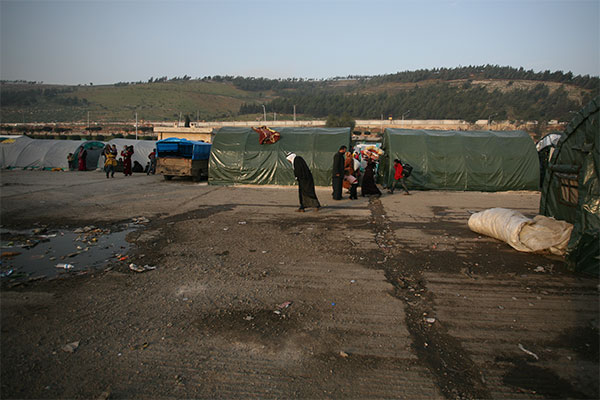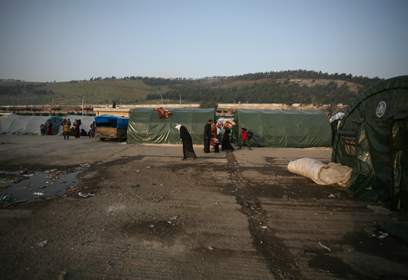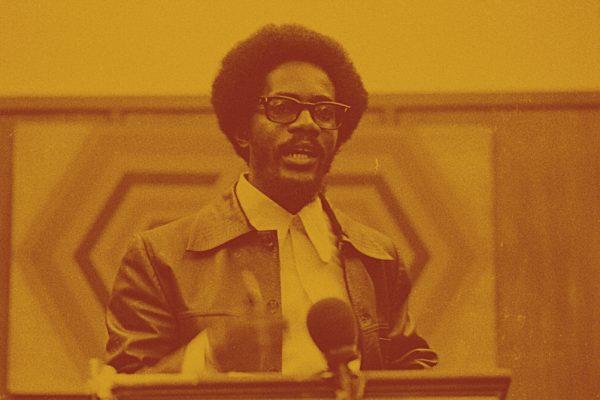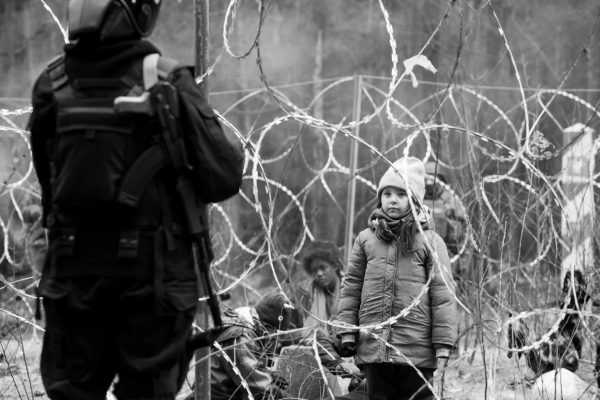
Syrian refugees mill about a tent camp in Bab al Hawa, on the Turkish border. Photograph: Michal Przedlacki
This time, Hammad did not expect to escape alive. He knelt on the side of a desert highway leading from Raqqa to Aleppo, fingers intertwined behind his head, where an ISIS fighter pointed a machine gun. “They told me I had committed a crime against Islam, against God,” he recalled of the five men who abducted him. We talked in Sanliurfa, Turkey, about fifty kilometers north of the Syrian border. A thin, wiry twenty-two-year-old with a penchant for chain smoking Kents, Hammad hasn’t been home in more than four months. (Hammad’s name has been changed for his protection. —Ed.)
He had not seen this coming. When ISIS swept into power in northeastern Syria in the fall of 2013, it won the admiration of thousands of rebels, Hammad among them. By the time ISIS arrived, he was a seasoned fighter, having joined the Al Muntasir Billah Brigade when the revolution began. An organ of the Free Syrian Army (FSA), the Brigade scored a major victory in March 2013 when it took control of Raqqa, the first provincial capital to fall to the rebels.
At that time, Abu Bakr al Baghdadi, who would become ISIS’s self-styled caliph, was a leader in Jabhat al Nusra, which answered to al Qaeda head Ayman al Zawahiri and had joined the FSA in taking Raqqa. But a power struggle was raging within al Nusra, and soon factions loyal to Baghdadi and Zawahiri were openly fighting each other. By the fall of 2013, Baghdadi had officially broken away from al Nusra.
“From the beginning, we saw the difference between ISIS and Jabhat Nusra,” Zaid al Faris, a university student in Raqqa, told me. “ISIS made a point to target activists,” he said—himself included. He was forced to leave eight months ago, after ISIS fighters threatened to kill him.
In August 2013 ISIS bombed the headquarters of Raqqa’s FSA brigade, forcing the group to leave the city. ISIS also fought the FSA in Hammad’s hometown of Deir Ezzor. “At first, ISIS was working with the FSA,” Abu Hanif, an FSA commander in Deir Ezzor, explained. “But then they started fighting us. We had to fight on two fronts, against ISIS, and against Assad, and we lost ground.”
Not everyone saw Baghdadi as a divisive force, though. Hammad was impressed by ISIS’s ambition and military prowess. In September 2013, he and others from his brigade joined ISIS. They were paid little, only 10,000 Syrian pounds a month. “After rent, I couldn’t even buy cigarettes,” Hammad said, “but I stayed because I loved fighting for God’s sake.”
ISIS set up special camps for recruits: physicians, pharmacists, lawyers, and fighters all attended months of Islamic law training. Hammad spent four months studying under a rotating cadre of foreign Arab fighters. “They taught us how to pray correctly, how to be trustworthy Muslims, how other Muslims had a flawed belief in God,” he said, pausing for a moment in thought. “At the end, you were ready to blow yourself up for them.”
• • •
It didn’t take long for the reality of ISIS’s rule to set in. After his training Hammad was assigned to a checkpoint outside Raqqa, where his job was to intercept rival fighters. In the process, he witnessed ISIS’s tyranny firsthand. “Every day they cut off FSA fighters’ heads and put them on pikes in the city,” he said. It became clear that ISIS was more interested in consolidating power than in toppling Bashar al Assad, the only goal the disparate rebels shared. And locals grew disenchanted with ISIS’s brutal and capricious justice.
Others had hoped for a different sort of law—a limited sharia system freed from the shackles of Assad’s regime. “We had all kinds of groups represented in the courts,” said Abu Ali, a former lawyer and FSA fighter who served as a judge on the sharia court in Raqqa. But in the fall of 2014, the court’s chief judge, a Nusra fighter, was kidnapped and killed by ISIS. Abu Ali says at least three other judges, from Nusra and the FSA, were executed by ISIS in public, without trials.
After his training Hammad was assigned to a checkpoint outside Raqqa, where he witnessed ISIS's tyranny firsthand.
“Just disagreeing with ISIS is enough to get you killed,” Faris said. Hammad already had his doubts, and the refusal to work with al Zawahiri raised more. He began to question Baghdadi’s aims.
Hammad was fortunate that, at the time, ISIS allowed Syrian fighters to quit. Hundreds have since been executed for desertion. But Hammad had been so indoctrinated that, once he left, he found himself in a deep depression. “I hated myself. For a month, I would stay inside my house, I would get people to bring food to me and I would eat it alone,” he said.
As ISIS dug in, other major rebel organizations responded. In January 2014 a coalition including the FSA, al Nusra, and Ahrar al Sham, a group formed by former political prisoners of the Assad regime, attempted to dislodge ISIS from Raqqa.
“People hated ISIS by then,” Hammad said. “Jeans were banned, women had to cover and be accompanied by a male relative, people were forced to pray in the mosque.”
Hammad was ready to turn against his former comrades. “We called a meeting of youngsters and went to a hospital we heard was being used by Ahrar al Sham,” he said. “I knocked on the door, and a man inside asked what we wanted. It turned out the man was from ISIS, and the hospital was being used by them. We lied and said we had come to rejoin ISIS, but he did not believe us.”
Hammad and three others were taken to a prison, where a Saudi commander accused them of plotting a suicide mission against ISIS.
“I got angry and screamed at the Saudi,” Hammad said. “He began to beat me to a pulp; I was bleeding everywhere. I shouted, ‘I am a Muslim and you are a Muslim, why are you hitting me?’” Hammad was blindfolded and thrown into a cell, but his friends were soon released. They called his uncle, an ISIS commander in Deir Ezzor, and got him out. “I had a connection, so they let me go. If you have a connection, you won’t get in trouble,” he said.
“When I returned to the outside world, everything was controlled by ISIS. Completely.”
• • •
ISIS has controlled Raqqa for more than a year. It collects taxes and utility bills and has opened a medical college. Police, called al Hisba, patrol the streets, scrutinizing every aspect of daily life. They handle minor infractions themselves, but more serious crimes are referred to courts run by hard-line Salafis from Saudi Arabia, Tunisia, or Egypt, men who hide their identities and mete out punishments ranging from fines to crucifixion.
For many, this governance by outsiders is particularly grating. “With the FSA, Nusra, and Ahrar al Sham, we had some disagreements, but at least they did not consider us the enemy,” says Sheikh Yasir, the son of the former mufti of Deir Ezzor. “Normal people who had participated in the revolution against Assad, they did so to get their rights, not to be ruled by a stranger who has no idea about Syrian society, or about Islam.”
With the rebel coalition having failed to oust ISIS, Hammad tried to make do. After his release he opened a tire repair shop in Raqqa. At first it went well. “Everyone in town, even ISIS commanders, came to my shop for repairs,” he said.
But life was hardly safe for Hammad. Around two months later, he found himself in a jail cell again. “There was a girl I liked. We would hang out sometimes,” he said. “Someone must have seen us talking, and they told someone in Hisba.” Men came to his shop and took him back to prison.
“I swear to God, it was so dark you couldn’t see your own hand,” he told me. “They beat me. They said, ‘You are a dog, you are destroying our country.’ They told me, ‘We are going to cut your arm off,’ and I was hysterical. I screamed, ‘Why would you cut my arm, that is the punishment for robbery?’”
A few days later, Hammad was once again saved by his ISIS connections, but over the next few weeks, he was hounded by foreign Hisba. The trip to the desert was prompted when fighters caught him smoking.
“I was trying to hide [a cigarette] with my hand, and a Hisba car came by. They were men from Tajikistan, Uzbekistan, or Pakistan,” he said. The five men laughed as they stuffed him into a car. Then they drove him to the countryside, took him out, and put a gun to his head. “They said, ‘We are going to judge you by God’s law.’” It might have been the end. Instead, the men beat him bloody with a cane and left him in the desert. The marks still scar his back.
He made his way back to Raqqa, but ten days later, more foreign Hisba came for him, this time for failing to close his shop in time for prayer. He spent three days in jail and was forced to pay 30,000 Syrian pounds to reopen.
With local support evaporating and Assad long since gone from Raqqa, ISIS is now effectively at war with the townspeople. Hammad, once prepared to die for the caliphate, made his choice. “I decided it was time to leave Syria. I had tolerated a lot, now I couldn’t even earn a living,” he said. “In my dreams, I would see them cutting my head off in front of a crowd.”








